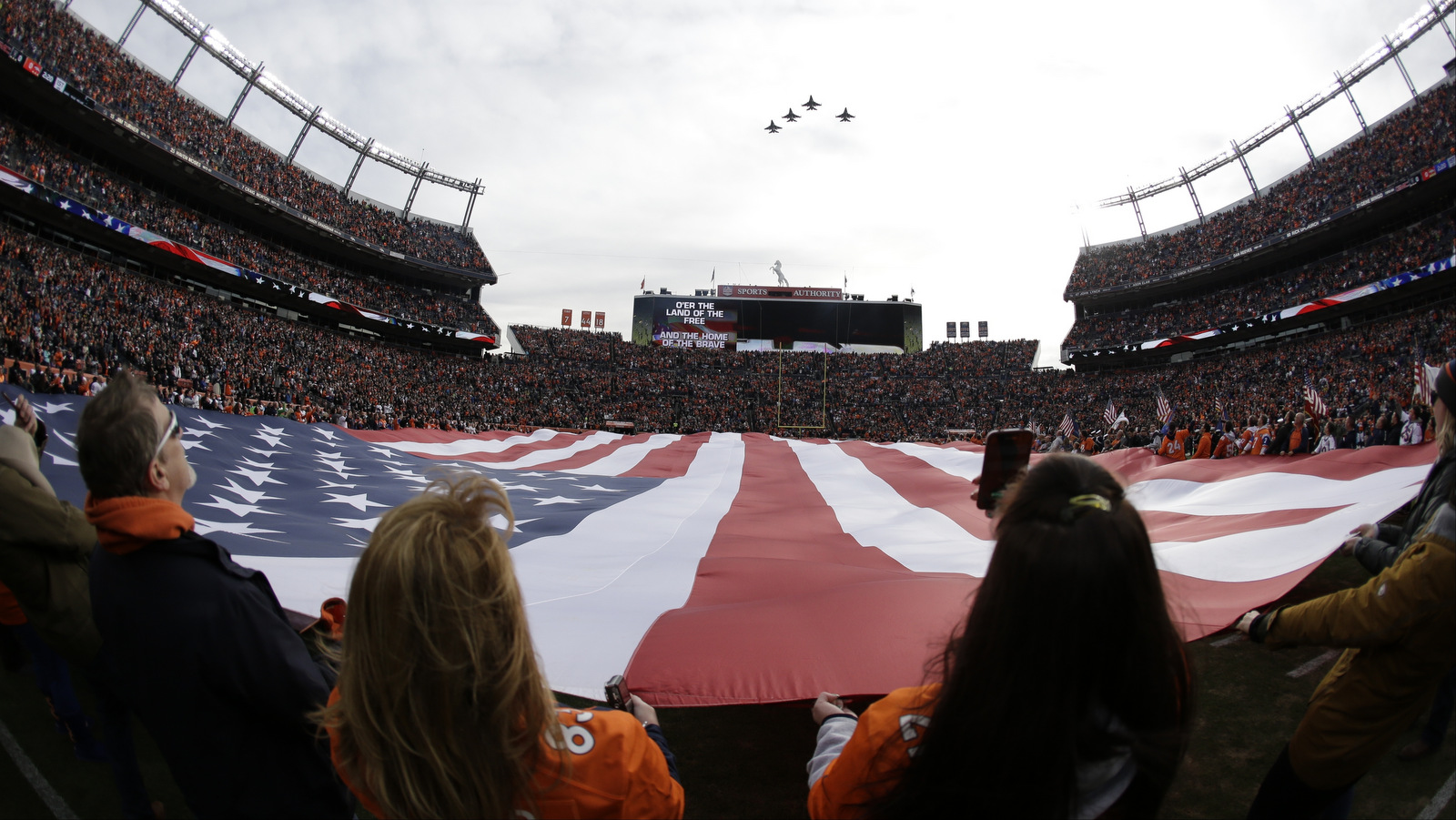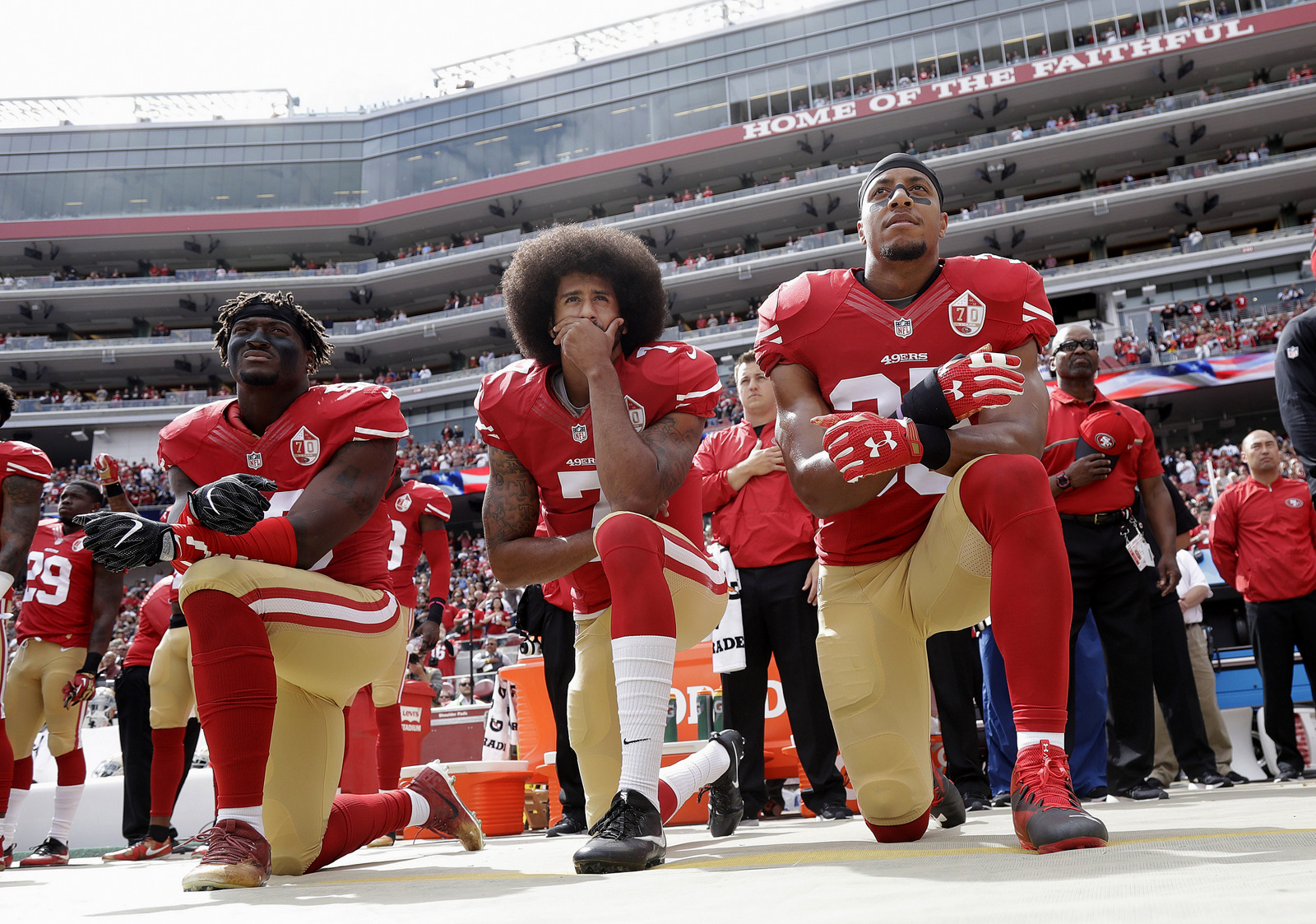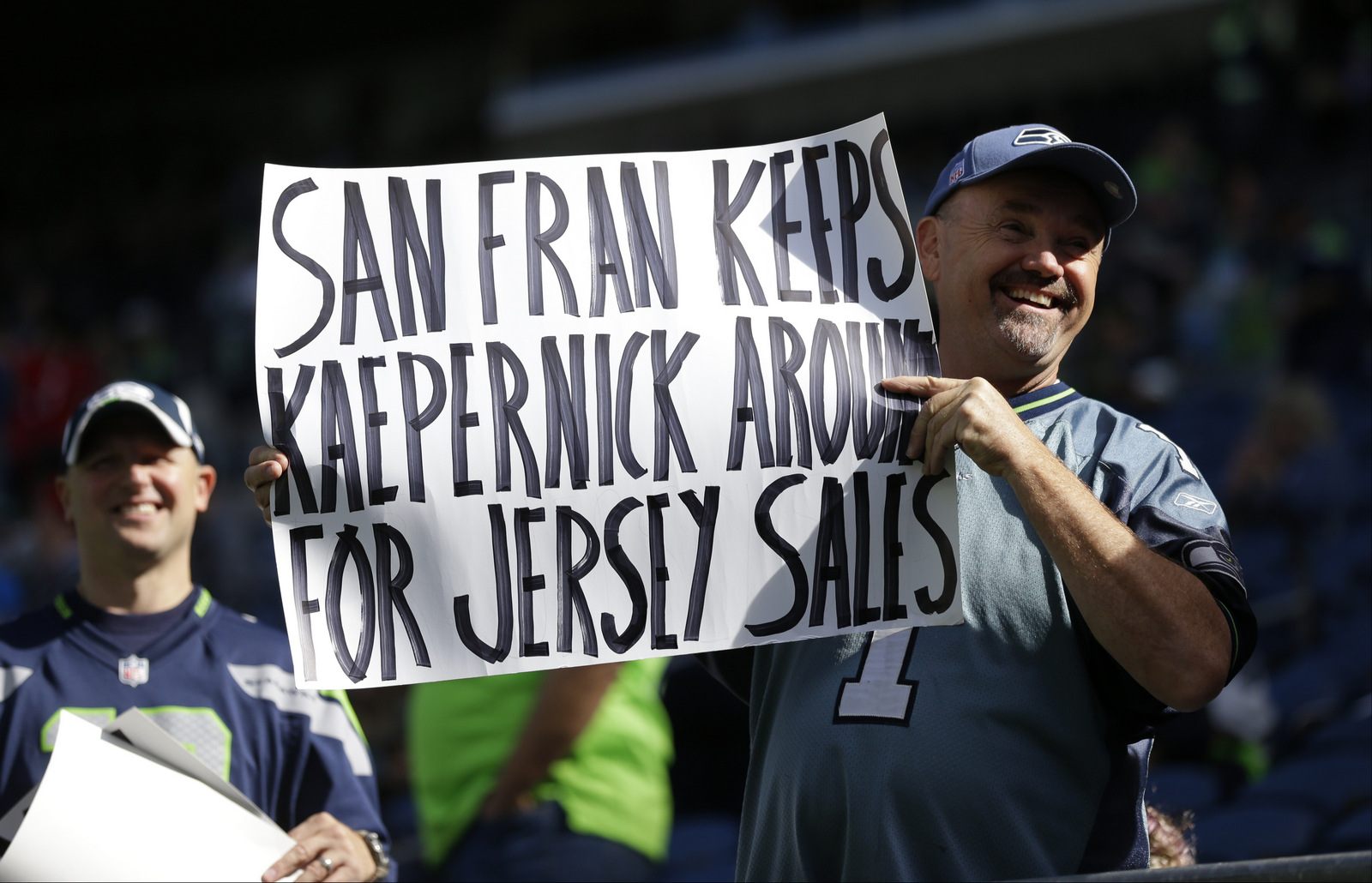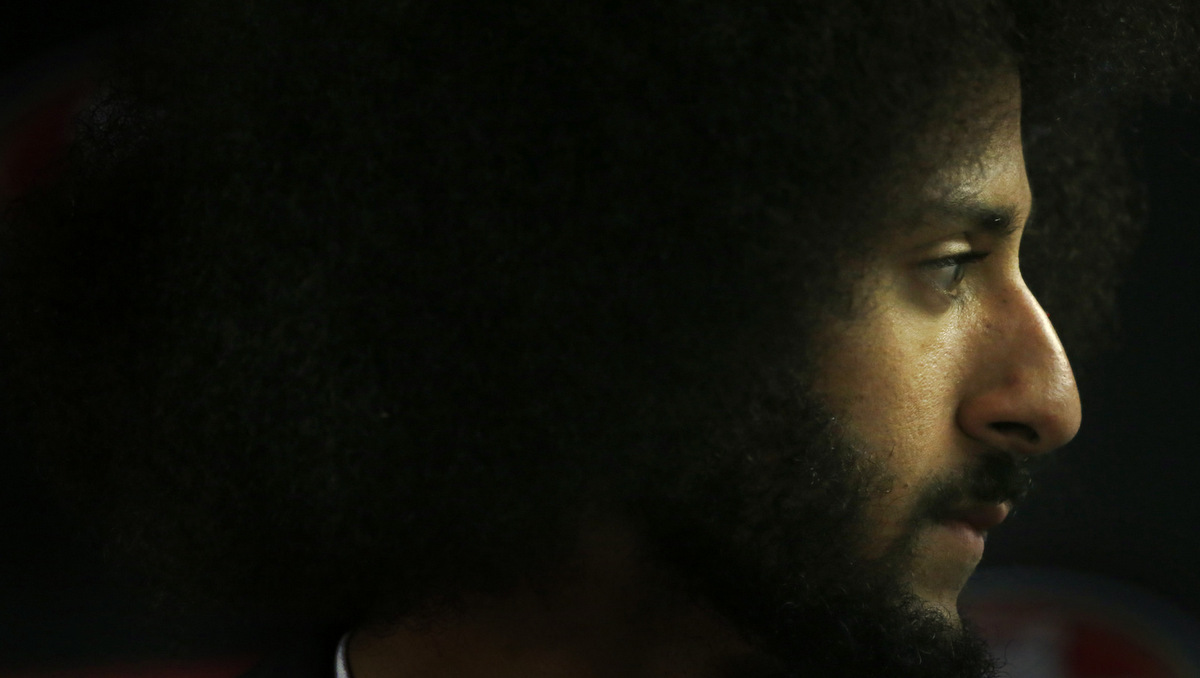In light of recent statements by President Donald Trump calling for retaliation against NFL players engaged in the free exercise of their First Amendment rights, this editorial – originally published on Jun 23, 2017 – has once again become relevant. MintPress brings you the original piece by Eric Draister in its entirety.
Like a million and a half other bleary-eyed workers, I commute into Manhattan early every morning. My train ride takes me right through the foul-smelling no-man’s-land that is the wetlands between East Rutherford and Secaucus, New Jersey – a methane-laden marsh that is beautiful in a “don’t dig or you’ll find a low-level mob guy’s skeleton” kind of way.
And, as I stare off into the hazy distance, dominating the skyline is that bulging, pimple-shaped eyesore that is MetLife Stadium, home of the NFL’s New York Giants and New York Jets.
And on this sticky, humid, gray June morning, I peer out the dirt-encrusted window of the NJ transit train out towards the stadium, sitting empty in anticipation of the upcoming football season, when every Sunday it will be transformed into America’s equivalent of Chartres or the Temple at Karnak – a sacred and holy space complete with the images and symbols of venerated saints of past glory, and hordes of devout worshipers clamoring for a glimpse of greatness, desperate for the communal belonging that comes with the price of admission.
And when the Giants and Jets begin their 2017 NFL seasons, they will do so with significant quarterback questions: The Giants, with their past-his-prime two-time Super Bowl champion Eli Manning, and the Jets with a God-knows-who collection of cast-offs and scrubs (Josh McCown? Bryce Petty? Christian Hackenberg? A bucket of sand?). One team has a desperate need for an NFL-level starter, while the other surely needs an insurance policy on their over-35 and consistently mediocre franchise quarterback, Eli Manning.
Both teams reside in a massive, high-profile football market. Both teams represent a city that boasts a majority of people of color. Both teams have a history of employing “controversial” players, some of whom have had significant legal and public relations troubles; the Giants kept serial wife-beater Josh Brown on the roster until public pressure forced them to release him.
And yet both teams have refused to even offer a tryout to the lone NFL-level starting quarterback who is still available just two and a half months before the season starts.
And why have both teams chosen to move forward with subpar starting and/or backup quarterbacks rather than offering a tryout to an unsigned free agent QB who remains head, shoulders, arms, waist, knees and toes above every other available QB?
Because that man is named Colin Kaepernick. And because that man has chosen to use his fame to draw attention to the institutionalized, systemic racism and violence that primarily targets people of color.
But oh, we’re told by the preening sycophants of so-called sports journalism – almost without exception just corporate mouthpieces with communications degrees – that it’s not racism that keeps Kaepernick off NFL rosters; it’s not the blacklisting of an athlete for the dangerous sin of being both black and politically radical.
No, it’s a purely football decision because Kaepernick is just not very good … or so they tell us.
Of course, no one would argue that Kap is Aaron Rodgers or Tom Brady. But “not very good”? Really?
Is Kaepernick worse than Josh McCown, Mark Sanchez, Josh Johnson, Geno Smith, Aaron Murray, Case Keenum, David Fales or Austin Davis? If your response to reading those names was “Who the hell are those people?” then you’d be joining the tens of millions of other football fans who would ask the same question. Still, every one of those scrub QBs has landed a spot on an NFL team.
But perhaps the even better question is: “Why is this even up for debate?”
Kaepernick’s real-world performance on the second-worst team in the NFL (the San Francisco 49ers finished 2-14 in 2016) was more than adequate. In fact, Kap was one of the better QBs in the league when he got a chance to start, even on a horrendous dumpster fire of a football team. Now, let’s look at some numbers. Forgive me non-football fan readers, but this is important:
- According to the NFL’s official research organization, Kaepernick threw 16 touchdowns and only four interceptions while going 1-10 as a starter. That was good for the sixth-lowest interception percentage in the NFL, just behind Aaron Rodgers and Derek Carr, two poster boys of the NFL who were considered contenders for the Most Valuable Player award in 2016.
- Kaepernick finished the 2016 season 16th among QBs in adjusted yards per attempt (better than two Pro Bowl QBs).
- Kaepernick finished 17th in QB rating.
- Kaepernick finished 13th in touchdown percentage.
- He finished second in total rushing yards among QBs despite starting just 11 games, as well as posted the best yards per carry of any player with at least 50 carries.
In short, any objective analysis of Kaepernick’s level of play shows that he is at worst a middle of the road, average NFL QB, which should make him sought after by every single organization and earn him tens of millions of dollars. Consider the fact that Brock Osweiler last year signed a $72 million contract and performed as one of the worst QBs in the NFL, performing far worse than Kaepernick in every offensive category. And yet Kap remains unemployed. Why?
Radical Liberation Politics in a Reactionary, Oppressive League
Kaepernick’s lack of a job is less about him than it is the NFL and American society as a whole. As the numbers show – and many experts agree – Kaepernick’s performance is, by any statistical measure, worthy of an NFL job. So there must be another reason for his fall from grace.
As ESPN’s Bomani Jones eloquently wrote:
“Stop hiding behind code. Stop trumpeting the idea that sports are the ultimate meritocracy, then shrugging and say ‘thems the breaks’ in the face of a visible potential case of discrimination. It’s intellectually disingenuous at best, indefensible cowardice at worst and sounds eerily like the worst of past evaluations and coverage of black athletes…And, then perhaps, we could address the cruelest irony of this. Kaepernick’s stand was a refusal to pay homage to American ideals because he couldn’t ignore America’s reality. Now, writers and fans are ignoring those same ideals and their defense of that outlook is … it’s reality.”
Indeed, it is good old-fashioned racism and white supremacy at work in the Kaepernick saga, not some putrid garbage about reading defenses, being a pocket passer or getting rid of the ball too slowly.
It is, once again, a professional sports league dominated by the same rich white billionaires who revel in ostentatious displays of hero worship for U.S. military – it makes no difference whether those wars are unjust, illegal, imperialist wars, mind you – and other agents of the state such as politicians and cops.

So, NFL owners and the league think Kaepernick is not NFL material? That he is a black eye (pardon the pun) for the game? Well, let’s remember just what kind of league we’re talking about. This is the same NFL that:
- Attempted to cover up and suppress information from studies establishing a correlation between football and brain damage.
- Proclaims itself to be a proud sponsor of breast cancer awareness and research with its pink-colored merchandise, but only actually gives 8 percent of the money consumers spend on pink gear to cancer research. In fact, the NFL takes 1.25 percent of the profits – and even more when they are the direct retailer.
- Maintained tax exempt status until 2015, despite being one of the most profitable organizations in the world. I wonder how many schools, hospitals and infrastructure projects didn’t get funded because of tax revenue that cities and states were cheated out of thanks to NFL accounting practices that have saved the league hundreds of billions of dollars over many decades.
- Refused for years to extend or expand long-term health benefits to former players, despite mountains of evidence regarding the long-term negative health impacts of football.
- Routinely allows teams to blackmail cities and their citizens into providing public funding for billion-dollar stadiums, while the billionaire owners rake in the profits.
And on and on and on. We’re talking about the same league that has all but canonized Ray Lewis, despite the fact that he was directly implicated in a double murder and, at the very least, was guilty of helping to cover it up. Instead, Lewis pled down to a misdemeanor and went on to spend years as one of the most well-known faces of the NFL.
Somehow, Lewis was not an embarrassment or a black eye for the league. Nor was Hall of Famer Michael Irvin booted from the league when he was found in a hotel room with a crack pipe, drugs and prostitutes. Nor is the NFL’s “tough guy QB” darling Ben Roethlisberger, a world-class rapist who, when he’s not too busy sexually assaulting young women, remains the face of the Pittsburgh Steelers, one of the NFL’s most storied and hallowed franchises.
Standing out and refusing to be silent
So what does all this tell us about Kaepernick’s situation? It’s simple, really.
It’s not that the NFL doesn’t want its players to speak. It’s that it doesn’t want its players to speak about things that matter.
It’s not that Kaepernick speaks up on behalf of oppressed communities. It’s that Kaepernick directly confronts the forces that engage in such oppression.
It’s not that Kaepernick isn’t an NFL quarterback. It’s that Kaepernick isn’t a silent, smiling NFL quarterback basking in the glow of his multi-million dollar toys and endorsement deals.

What the NFL really wants is a league full of Tom Bradys: White, smiling yes-men who date supermodels and say things like, “What’s going on in the world? I haven’t paid much attention. I’m just a positive person.”
Tom Brady is a hero and an icon, hailed as perhaps the greatest QB to ever play the game. But while his accomplishments on the field are second to none, he remains a privileged, narcissistic, Trump-loving mush-head who has zero interest in the communities from which many of his on-field teammates hail.
In contrast, Kaepernick has donated hundreds of thousands of dollars to worthy, grassroots organizations working in communities of color. Just in March and April, Kaepernick’s donations included, but were not limited to:
- Life After Hate, Inc. – an organization that works with individuals and organizations dealing with racism and intolerance ($50,000).
- Leaders of a Beautiful Struggle – a Baltimore-based group that works to improve living conditions for black communities in Baltimore.
- Silence is Violence – a New Orleans-based group that works to build a “safe and equitable New Orleans.”
- Assata’s Daughters – a Chicago group that focuses on black female empowerment in the tradition of Assata Shakur ($25,000).
- H.O.M.E. (Helping Oppressed Mothers Endure) – a Georgia-based group that is using Kap’s donation to purchase beds for single mothers and their children ($25,000).
- Grassroots Leadership (Texas Advocates for Justice) – Four weekend-long intensive workshops with community members who have been incarcerated. The goal of TAJ workshops is to develop leadership in the movement to confront mass incarceration and end reliance on the criminal justice system by training approximately 30 new Texas Advocates for Justice members in each workshop ($25,000).
- American Friends Service Committee Arizona – covering the costs of behavioral health treatment for formerly incarcerated/convicted people participating in AFSC programs.
It should also be noted that Kap spearheaded a campaign to secure a plane, as well as food, water and other supplies, for the people of Somalia. The campaign raised more than $1 million in its first 24 hours. As Kap announced at the time via Instagram:
https://www.instagram.com/p/BRwJh_GFXx9/?hl=en
In hours, Kap was able to achieve what the U.S. government and every multi-billion-dollar corporation and foundation simply could not.
Notice also that the organizations Kap is backing are all community-focused, grassroots groups that will directly apply donations to their initiatives. These are not large non-profit NGOs that pay generous salaries to their management while only distributing a portion of donations to those in need.
Put simply, Kap is directly financing the defense and development of economically marginalized and oppressed communities – something that the NFL itself has always talked about, but never done.
Building a legacy of empowerment and justice
Colin Kaepernick is an NFL QB who deserves a job. He may not be the best QB in the NFL, nor will he be a Hall of Famer whose name will be etched into the history of professional football. If anything, the powers that be would like to see him erased completely.
Unfortunately for the NFL and the cop-worshiping, military fetishists draping themselves in Old Glory (and the Confederate rebel flag), Kaepernick is not going quietly into that good night. He won’t be receding anonymously into obscurity.

No, Kap is making himself a household name for all the right reasons. And the NFL simply cannot stand it.
There are kids in New York City who will go to school in September sporting free backpacks purchased with Kaepernick foundation money. There are single mothers in Georgia who will lie down with their children on beds provided for free thanks to Kaepernick’s donations. There are young black leaders in Baltimore who will help build their community, thanks to Kap’s money.
Kaepernick could never play another NFL game as long as he lives, and he’ll still be a hero and a legend to millions.
For Kap, his legacy is important. It’s just that he’s finally realized that his legacy will be in uplifting oppressed communities, not in his stat line.
He will be remembered not as another quarterback, but as the man who stood up to racism, imperialism and white supremacy, paid for it dearly, and never regretted it for a second.
Top photo | San Francisco 49ers quarterback Colin Kaepernick listens to a question at a news conference after an NFL football game against the Chicago Bears on Sunday, Dec. 4, 2016, in Chicago. The Bears won 26-6. (AP/Charles Rex Arbogast)


